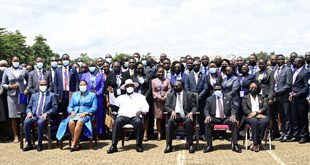
Kampala, Uganda | THE INDEPENDENT | Until the 1990s, Uganda’s coffee industry had the same characteristics with that of Vietnam: low productivity, poor agriculture inputs and slow growth. But today, Vietnam produces 27m bags annually while Uganda produces 4.7m bags.
Now in a bid to boost production, Uganda is mooting a law that will see existing and prospective coffee farmers registered.
According to the National Coffee Bill, 2018, the land where the coffee is grown or is to be grown shall have been evaluated by the Uganda Coffee Development Authority to decide whether it is suitable for growing coffee.
However, this has been a contentious issue since the bill came to light early this month with Ugandans questioning the motive for registration.
But how did the world’s leading coffee producers improve production? We look at Brazil, the world’s number one coffee producer and Vietnam, the second-largest producing country.
Last year, Brazil produced 58 million bags of coffee (60kgs each) while Vietnam 30 million bags of coffee. Uganda produced a paltry 4.7m bags. Uganda had plans to produce at least 20 million bags by 2020, a target it will not achieve.
For starters, much of the farmers in Brazil is produced by smallholder farmers but the country made sure it brought them under cooperatives.
According to the World Bank, the farmer associations or cooperatives not help them acquire machinery and warehouse facilities for processing coffee but also established strong market linkages in Europe, USA for them.
The World Bank says because they are bigger and stronger than individual farmers, the collectives are also able to install major post-harvest infrastructure to help with value addition.
Joseph Nkandu, the Executive Director of Nucafe Uganda, said Brazil got right at the policy level, brought them together in cooperatives and created a coffee fund for them.
But Nkandu adds that Brazil got it right at the research level. Brazil has done research specifically geared at improving their coffee production, handling and high yielding varieties.
On the part Vietnam, according a comparative study by the Economic Policy Research Centre (EPRC), the Southeast Asian country’s success has been based on Vietnam’s coffee success had a lot to do with acreage expansion; input intensification that increased productivity per unit area.
To increase land for coffee farming, Vietnam cut down some of its forests, much to the disapproval of environmentalists.
In Vietnam also, farmers use one of the highest fertilizers per acreage in the world. This is not the case for Uganda.
According to researchers at EPRC, Uganda has registered limited progress on the two fronts – acreage and productivity which has mainly limited what it can achieve in coffee production.
According to the proposed law, government seeks to regular all on-farm and off-farm activities in the coffee value chain.
Konrad Brits, the director of Falcon Coffees in UK, said on his recent visit to Kampala that “Ugandan farmers have not been taught how to handle their coffee. The handling is very poor, resulting into the negative differentials we see today.”
This will help it monitor and control issues like pests and diseases and ensure farmers use better means of production.
Some analysts have said Ugandan coffee farmers’ problem is not registration but issues like irrigation, land ownership, and access to genuine fertilizers.
In a statement on Tuesday, the Uganda Ministry of Agriculture registration of farmers is intended to help establish the origin of produce. This, the statement read, would mean in case of an outbreak of a disease, they can easily be traced.
*****
URN
 The Independent Uganda: You get the Truth we Pay the Price
The Independent Uganda: You get the Truth we Pay the Price


